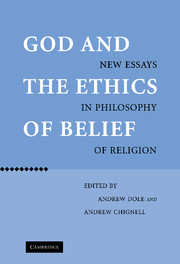Book contents
- Frontmatter
- Contents
- List of Contributors
- Acknowledgments
- The Ethics of Religious Belief: A Recent History
- PART ONE METAPHYSICS: GOD AND CREATURES
- PART TWO EPISTEMOLOGY: GOD AND THE ETHICS OF BELIEF
- 5 The Probability of the Resurrection
- 6 Is God an Unnecessary Hypothesis?
- 7 Direct Warrant Realism
- PART THREE SOCIAL-POLITICAL PHILOSOPHY: GOD, ETHICS, AND BELIEF
- Index
5 - The Probability of the Resurrection
Published online by Cambridge University Press: 25 July 2009
- Frontmatter
- Contents
- List of Contributors
- Acknowledgments
- The Ethics of Religious Belief: A Recent History
- PART ONE METAPHYSICS: GOD AND CREATURES
- PART TWO EPISTEMOLOGY: GOD AND THE ETHICS OF BELIEF
- 5 The Probability of the Resurrection
- 6 Is God an Unnecessary Hypothesis?
- 7 Direct Warrant Realism
- PART THREE SOCIAL-POLITICAL PHILOSOPHY: GOD, ETHICS, AND BELIEF
- Index
Summary
A central doctrine of the christian religion is that jesus Christ rose from the dead – which I interpret in the traditional way as “rose bodily” from the dead – on the first Easter morning. In this paper, I seek to investigate the question of what kind of historical evidence and how much of it we would need to establish it as probable that Jesus did rise bodily. For reasons of space, I cannot assess the details of the historical evidence here, but I have done so in a recent book.
In assessing any historical hypothesis, we have to take into account three kinds of evidence. The first kind is the most obvious kind – the testimony of witnesses about and the physical data caused by what happened at the time and place in question. If it is suggested that John robbed a certain safe, then our obvious historical evidence is what witnesses said (about who was near the safe at the time in question, and where John was at that time), and physical data such as fingerprints on the safe, money found in John's garage, and so on. I shall call such evidence the posterior historical evidence. Insofar as the hypothesis is a simple one, and the posterior historical evidence is such as you would expect to find if the hypothesis at stake is true but not otherwise, that is evidence that the hypothesis is true.
- Type
- Chapter
- Information
- God and the Ethics of BeliefNew Essays in Philosophy of Religion, pp. 117 - 130Publisher: Cambridge University PressPrint publication year: 2005



